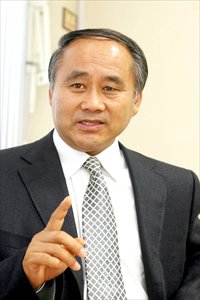Timing not right for new code of conduct

Editor's Note:
Some Southeast Asian nations, including the Philippines and Vietnam, are promoting a code of conduct for the South China Sea. China has stated it won't consider engaging in a discussion with ASEAN over the issue unless the conditions are mature. Why are the Philippines and Vietnam promoting this move? Would such a code help solve disputes in the region? People's Daily Online (PO) talked to Zhang Yunling (Zhang), director of the Institute for International Studies under the Chinese Academy of Social Sciences, on these issues.
PO: It has been 10 years after the Declaration on the Conduct of Parties in the South China Sea was signed in Cambodia. Why are some countries promoting a code of conduct for the South China Sea now?
Zhang: There were some disagreements among ASEAN members when signing the declaration and we set some basic principles to publish in the form of a declaration. Among them, the first is that we do not resort to the use of force but settling disputes by peaceful means. The second is that we resort to consultation to settle sudden incidents. If we conform to these principles, we can find ways to ultimately settle the disputes through negotiation.
Though the overall situation has basically stabilized after the declaration has been published, we found there are still some small conflicts. Some argue it is necessary to put forward binding codes of conduct since there has been growing confrontation between countries, especially in the last two years.
PO: How to understand the intention of countries like the Philippines and Vietnam over the issue? Can this code of conduct really solve the South China Sea problems?
Zhang: It is very clear that they want to maintain the current situation by developing binding guidelines.
But China insists that neither the declaration nor the guidelines are legal documents for dispute settlement, but rules to create conditions for resolving the problem through negotiations. We do not admit the current situation is valid, but we admit there are disputes and the settlement needs the countries involved to negotiate with each other.
The disputes are mainly over the questions of islands and principles of the continental shelf.
Yet these problems cannot be solved by declarations or codes of conduct according to the delimitation of continental shelf and exclusive economic zone by the UN Convention on the Law of the Sea.
A code of conduct could be signed to keep peaceful development but are not documents to settle disputes. And the countries concerned must negotiate in order to settle disputes.
PO: How do other countries of ASEAN see the South China Sea issue since it is said that the foreign ministers of ASEAN members have reached an agreement in key terms of the code of conduct for the South China Sea?
Zhang: I think they have reached an agreement to stick to some principles. Firstly, there is a basic principle saying there will be no resort to the use of force but instead peaceful settlement of disputes in the Treaty of Amity and Cooperation in Southeast Asia signed by China and ASEAN.
It is also clear that China intends to maintain the overall cooperative situation. Hence the code of conduct is for stabilizing the situation but not for settling disputes. However, some countries like the Philippines and Vietnam want to have articles prescribing no changes of the status quo and thus constraining China.
Some countries like Malaysia and Brunei also have disputes with China, and many islands possessed by Malaysia are in this disputed area. So they want to patch up the quarrel and reconcile the parties concerned and they worry it will provoke China. It is bad for their interests if China take actions against them. For them, it would be good not to blow things up.
Hence other countries except the Philippines and Vietnam have been very quiet on the issue and hope to maintain the cooperation with China and avoid big clashes, since China is too important to them as their largest market. ASEAN's economy would have trouble without China and the effect on them would be much more serious than that on China.
PO: Will these countries think about it carefully when dealing with these problems since China became the largest trading partner of ASEAN in 2011?
Zhang: No matter how many difficulties it will meet, China will sustain economic growth over the next decade or two, and its market will grow bigger and bigger. So China will play a more and more important role in the economic development of countries in Southeast Asia. At the same time, China's investment is expanding beyond the seas, which is also of significance to those countries.
Although some media took a fierce attitude previously, they have changed a lot. They cannot bear the costs of such a big conflict.
Yet I think the situation has some advantages. At least it shows that policymakers and most people still care about the stability of this area and the relationship with China. Moreover, the relationship between China and Southeast Asian nations should not be affected, since only a few countries have disputes with China in the South China Sea.
As far as I am concerned, peace still remains the mainstream view. And all of us worry that there are certain risks if current trends continue.
All of them need to take a step back and find the way forward in order to settle disputes and ease the tension though the conditions aren't ready for it.
So we need to create these conditions, which is the key that China and ASEAN should take into consideration when putting in place codes of conduct.